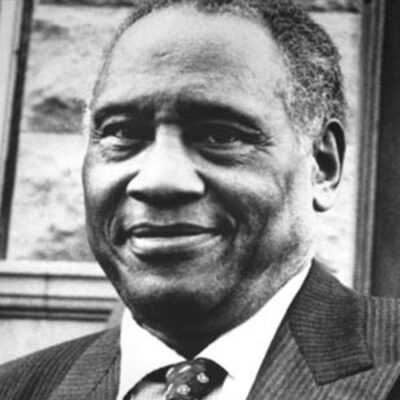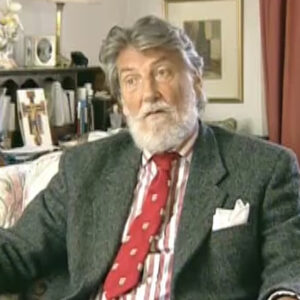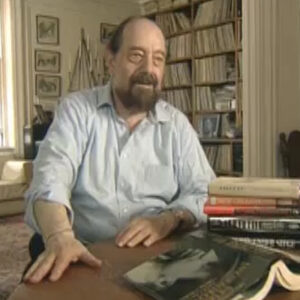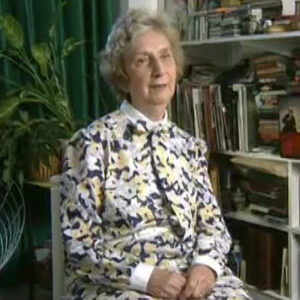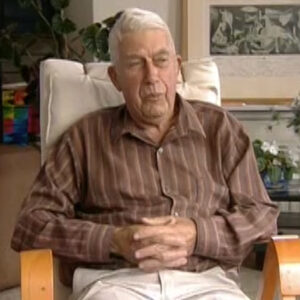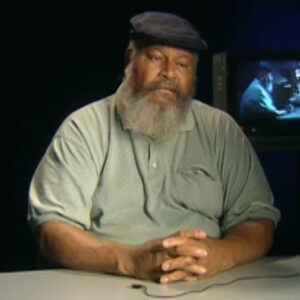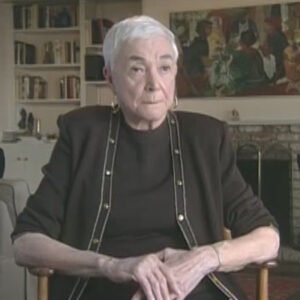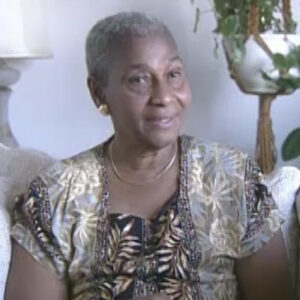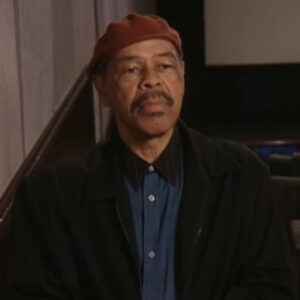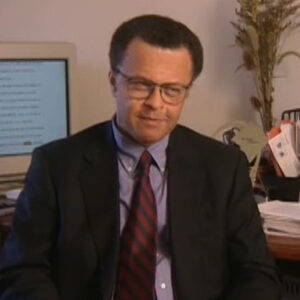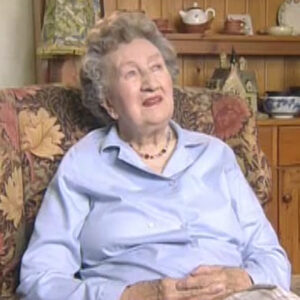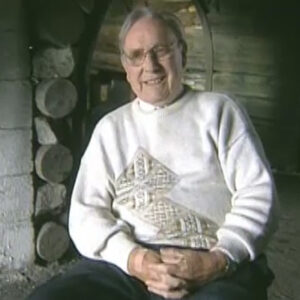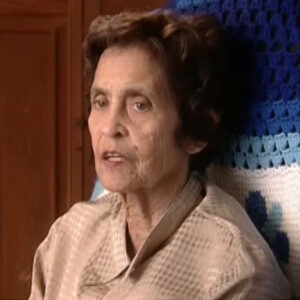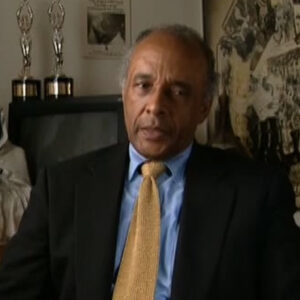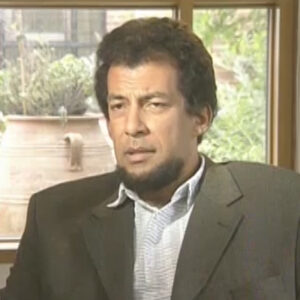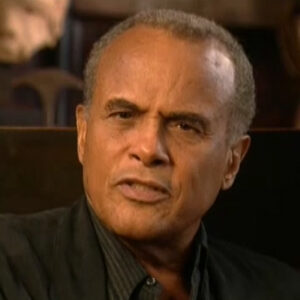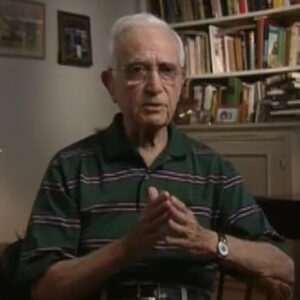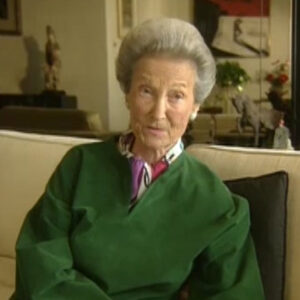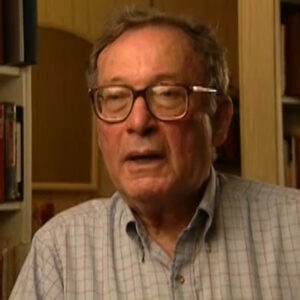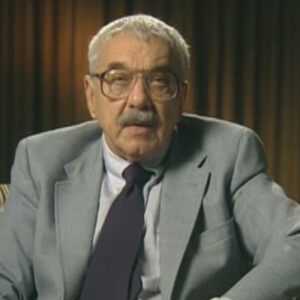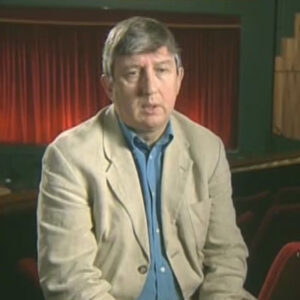Speaker Yeah, I think, you know, for me, I think it’s first of all, there’s always an infinite number of ways that people sort of become politically active. And I think my way for like some other folks, you know, came from the fact that my parents were politically active. And so in growing up in my household, simply being exposed to so many different political ways of thinking activists, people from different parts of the world talking about what’s going on in their countries. I think it came very natural for me then to kind of have that that thirst and hunger for knowledge and really understanding what’s going on in the world was in growing up was and obvious.
Speaker I mean, the thing I discovered in making this film is a lot of people really don’t know what they know and they know it as an abstract. Right. You know, I was an obvious person that people sort of mentioned in those kinds of early discussions.
Speaker Yeah, I mean, I was fortunate. I mean, I’ve had people that have mentioned Paul Robeson. I mean, the name.
Speaker I’m sorry. Think you can’t?
Speaker OK, I was gonna say I was very fortunate in the fact that the name Paul Robeson was mentioned in my home, I know in my house we actually had a posters. We had more than one poster of Paul Robeson in our house. So that was, for me, a direct relationship like we know who was this guy, you know, what was his man about? What kind of person was he? When did he live? You know, approximately what time in history.
Speaker So for me, there was a direct relationship with some of the other people you grew up with. What ain’t it also?
Speaker Well, I think, you know, as with many figures in our history, you have some folks that are more known, you know, Malcolm X, Martin Luther King and what have you other folks who are not really as well known. And I think it’s pretty fair to say that and think about most other folks that I knew around my age were not really aware of Paul Robeson, you know, or the kind of person that he was or maybe if they had heard things or maybe heard one or two things about him. But I didn’t really have a sense of his real legacy.
Speaker OK, now the group that you work on, tell me about the group you’re working with now and what’s the name of it and how did it come about?
Speaker OK, this year on the week, the June 19th weekend, there was a meeting in Chicago, activists really from all over the country, black activists from all over the country and even from folks from different countries who came together after a call for go work for the OK.
Speaker So OK to start up in the meeting.
Speaker OK, as I was saying, June 19th of this year, the weekend, there was a gathering of over 2000 black radical activists from around the country and even from other countries. In that meeting, approximately 200 younger people ranging from ages 15 to 33, 34 actually from all parts of the country, also came to that meeting because there was a call that was put out that this was also an opportunity for youth activists to come together for a weekend of really interacting and networking and really getting to know each other. It was it was an incredible amount of energy and a credible event, because I don’t think you really have too many times where you get 200 young activists who are all doing things in their communities around the country, coming together in a single space for a single time and almost just getting totally, totally engrossed in dialogue and exchange.
Speaker I mean, the youth caucus that came out of the BRC, the black radical Congress that weekend met almost 24 hours a day. I mean, they were there were young folks like, well, let’s take me and go into one o’clock, two o’clock. We don’t care. We want to keep meeting when I keep talking because I want three things really jumped out that people, I think, driven through that kind of energy. The first one was people realize that one, they were working on a lot of the same issues in their own communities, but didn’t really know that other folks, other young people their age were also working on issues. And they were really, really shocked and surprised when they would find some folks, like in Frisco and some folks in Oakland didn’t know each other, but actually are involved in the same struggle in their own individual communities. So I like how you open Oakland. You’re doing police brutality work. We over in Frisco doing police brutality work. You know, we got to get together. We got to coordinate more. So that was a first and it was very exciting. The second thing is, contrary to a lot of popular notions, there is an incredible amount of energy and interest for action on the part of young people in this country right now. You know, a lot of folks there, you know, you just, you know, just kind of dancing and partying days of ways and what have you. But there’s a lot of folks who are very, very interested and want and want to do work, want to take action. And so that kind of energy, which I think we’ll see again of the Million Youth March, was very prevalent at this meeting. And then the third thing is you have people that are very clear. They want to do something right now. But they’re also very, very clear on the need to talk about rebuilding a movement and in a sense, being part of a new kind of organization. So those kind of three things became very evident over this whole weekend of young folks really getting together and talking. And it’s been an energy that has even sustained itself after the weekend.
Speaker So the people that you work with, I say that like a regional.
Speaker Precisely. The folks that basically what we realized, we had 200 young people there and roughly there was a four regional sort of breakout out of the northeast region, which comprise about 50 to 55 people. There were at least 15 to 20 folks from the New York City area.
Speaker And so since that time, those original 15, 20 folks have been meeting on a regular basis back here in New York since that first meeting in Chicago. And that’s really the formation allow for the formation of the New York City black radical Congress Youth Caucus, which is which is an organization I’m a member of right now.
Speaker So now when you when you all talk and no one.
Speaker What kind of things you talk about his action, right, but also, do you have a sense that you’re in a tradition or do you think that you.
Speaker That’s that’s right. I think I think there’s there’s there’s two things that really kind of jump out when when we’re gathering, when young activists are gathering. OK, there’s two areas, I think, of work that really kind of jump out or dominate the different kinds of discussion. The first one is in the area. Really want to do work now. I mean, there’s there’s almost like a burning desire amongst youth activists around the country. We got to do things now. Got to be in the streets now. We got to be working on something right now. You know, we just got to do it right now because, you know, people are dying, we being gunned down. We’re doing this. So there’s that kind of feeling. And so a lot of the discussion is like, well, what should we be doing? What are the key problems that we got to address? What’s the basis for determining the key problems that we got to address? You know, how do we avoid dealing with symptoms of problems and make sure that we’re dealing with the problems? You know, so that kind of discussion and debate and struggle is very heated oftentimes and very extensive. The second area of I think of topical discussion, again, around rebuilding a movement, so to speak, in those discussions, we do get into a lot of heated debates about like, you know, what kind of tradition should we be looking for to learn lessons from the past that are useful. Now, who are the leaders, let’s say, in the past, both as elders and even ancestors? Should we be checking out and really trying to educate ourselves on? So in those kind of debates and discussions, a number of historical figures jump out on a regular basis, you know, and people will tend to you know, people have a tendency to draw upon history oftentimes as a way to support their political views. OK, and what we’ve even tried to get around is saying that learning from history isn’t just mean. You understand the history as a means of back up. You know what your line is or what your political we’re trying to push for. A new position is where we say learning is really about seeing drawing lessons from history, but applying them to the current really pragmatic realities that a lot of youth want to deal with right now, which I think is a very different process. And in thinking about it like that, it’s not so much we’re just trying to let’s say, you know, read people that we respect from the past, but we’re all trying to say, what lessons can we pull from them to implement in our own strategies and our own tactics, not only just to find solutions, but an aide, I think is the key thing that I’m finding most invigorating. But a lot of young people that are getting together now are saying it’s not about even finding new solutions. It might even be more about the process of finding new questions that we really then need to go out and seeking to answer if we really want to create a movement for the 21st century, because many folks will say, you know, exploitation and oppression and the things are going on, you know, maybe be different now, you know, the 21st century being upon us, global capitalism being different now, where it’s not so much that people are being exploited anymore or less or press any more or less, but the nature of that exploitation or the forms that oppression may be different now. And if that’s the case, we perhaps maybe need to rethink again some of the questions that we tend to always want to focus on, because if the forms of expression are pushing are different, then perhaps again, some new questions are needed as well as answers. So that’s where we get into those kind of discussions on.
Speaker Yeah, yeah, yeah, yeah.
Speaker Music playing These is really the only player on Quest.
Speaker OK, here’s the question, how understand you’re now given this new threats, which I think is very interesting. I mean, I tend to agree with it.
Speaker Does Paul Robeson.
Speaker Is he someone who you can kind of go back to in the traditional sense, or in fact, was he ahead of his time and therefore might might conform to this new paradigm that you guys are coming up with?
Speaker OK, I think the value or the or the relationship between Paul Robeson legacy for like younger activists. Now, you can probably talk about it in a couple of different ways that, well, you could find real value in terms of, let’s say, like, you know, other things that he talked about or things that he did or the way that he did things. Could we perhaps use some of those kinds of things now and find them valuable and useful? And I would definitely say the answer is if you’ve read Paul Robeson, if you have some knowledge of what kind of man he was, your answer would be yes. And I could give you really one example that always jumps out for me is that Paul Robeson was clearly known as someone who elevated the struggle and plight of African-Americans and in the history of Africa, the African-American experience, but also reflected on it in a international context. He was very, very clear. He had an international aspect to his work as an activist or as a scholar or someone you know, and involved in the struggle for for liberation and democracy for his people.
Speaker Now, I would say that that is extremely relevant today, because, again, one of the things that that a lot of youth activists that I talk to feel when we talk about the relations between, let’s say, analysis and strategy and tactics, one of the things that we say is that you probably couldn’t create strategy and tactics that are relevant for people right here now today, unless that strategy, unless those tactics came out of an analysis that was one global in context, given the kind we live in a 21st century global kind of environment, but simultaneously local and relevance, you know, without one. Without the other. OK.
Speaker Well, again, I think it’s very, very clear that strategy and tactics for today that would be effective, we believe, would have to come out of analyses that were both global and context, but also local and relevant, because at the end of the day, if you have analysis which are one or the other, you probably won’t be to actually generate effective action. And you may just be getting that analysis for the sake of intellectual stimulation. And that’s not a kind of progressive analysis that we think we need. Analysis need to be rooted in. What’s the reality for people that are going to maybe use that analysis to go out there and do work in their communities? So I think Robeson then definitely reflected that in how he analyzed the conditions of black people and how he elevated the discussion to not just an American national issue, but a human issue, an international issue, very much like Malcolm X, you know, in the latter part of his life and saying the struggle for civil rights in this country is not a civil rights struggle, was a human rights struggle. So I would see a parallel there. And many of us recognize Malcolm X for his internationalism. But we could say the same thing about Paul Robeson, you know, in terms of his internationalism, I think a second way or second aspect of Paul Robeson that would definitely speak to a lot of young folks now would definitely be in the fact that he was an artist. And it’s very, very clear when you talk to a lot of youth activists nowadays, there there is a clear sense that youth activists feel there is a fundamental role for art and culture to play in helping people of color and black people and black youth in particular, to really deal with it with the kind of attacks that they’re facing right now. So in that sense, there is a clarity that there could really there is no such thing as separating art and culture from like the fact that art and culture can be weapons used for or against you in the community. Paul Robeson was an example of how he used himself as an artist and used his art as a weapon for his people. In this current day and age, we oftentimes get the sense that what you hear from some artists, who is the entertainer, you know, and therefore somehow in their own mind, they separated their art from the reality of their people. And we would be very, very clear. Capitalism tends to do that. I mean, Calvinism will say, you know, your art, irrelevant in the society, is just a commodity bought and sold like anything else, you know. So don’t even think about it that way. Clearly, you know, history has shown us from Paul Robeson to people like America, Cabral and stuff like that, art is a weapon for or against you in your culture. And therefore, a lot of youth activists feel we got to make sure that we recapture maybe and control hip hop culture so that it becomes a weapon that’s used for us and not so much be a weapon that’s really used against us. So I think once again, one could draw a parallel between youth activist today saying there is an important value placed upon art and the kind of man that Paul Robeson was as a conscious, progressive artist, which is very, very clear that for him there was no separation between him being an artist and him being progressive and him fighting for for his people.
Speaker Now, you folks are going to meet on the 5th to participate, but what do you plan to do essentially?
Speaker Yeah, I mean, this coming this coming Labor Day weekend, you know, the Million Youth March been lots of discussion and debate going on in the media and stuff like that. And whether it’s a good thing or a negative thing, very similar to how at the Million Man March was debated and discussed before it happened. And then in hindsight, a lot of folks, depending upon the level of analysis you use, come out. There was a good thing or was a waste of time or a bad thing or what have you. So we can all expect they’ll be similar kinds of things after the march is over.
Speaker But prior to that, we recognize again that one sometimes a whole and the next year for. OK, but he’s for.
Speaker OK, so so with regard to this upcoming Million Million Youth March, my group of you know, the folks that I work with, we recognize that clearly there’s a lot of interest and energy on the part of young people who will probably be the main reason why a lot of young folks will come up and we’ll show and be a part of this million youth march, regardless of, let’s say, their level of political understanding or political consciousness or what have you. Once again, that’s what we really discovered at the first meeting in Chicago when we had 200 young folks there from a broad variety of levels of understanding and consciousness. The only thing it was very, very consistent was the energy and the desire to do something we recognize that’s going to be there as well. You know, at this Million Youth March and although we have some political differences with some of the principal organizers of the march, some of the players that have been involved in creating the march, our position is that we have to really engage the young people that will be at that march. And even as we are sort of in still in the process of really getting our organization going and really getting it properly structured and what have you. There’s no reason why we should not take advantage of the opportunity to engage the energy of thousands, perhaps hundreds of thousands of young people that are going to be out there. So we’re going to be out there. And one of the things that we’re going to try to do be to be talking to young folks and doing a lot of flowering and leafleting, is that we want to let young people who we know are there perhaps for different reasons. But maybe one common reason is they’re interested perhaps in learning more about how they can get involved and doing things in their community. We want to let them know that there’s actually other organizations of young people like them who are in the process of building the capacity to really be effective in their own communities and do work in their own communities. And let this be a way to say, hey, you may not be ready, let’s say get involved in a group right now, but know that those groups are out there. And here’s a name of one group of young people right here in New York City, you know, that that are going to be doing work. So keep an eye out for us. Like, for example, you may hear six months from now we may be doing a program and you might say, hey, you know, I read a flyer about this. These guys, you know, when I went to the Moon Youth March, you may and come out to that activity and say, OK, so this is what you guys are about. This is what you’re trying to do. So we’re looking at as a way again, to really simply just to engage, provide some information and some analysis for a lot of the young people that are going to be there, regardless of the reason why they’re going to be there.
Speaker Let me ask you this.
Speaker This is something Robeson was allied with Weightlift groups, but he was also very conscious about his black. Is there and I know it is a black radical Congress. And there was a lot of discussion of, you know, nationalism versus definitely Marxism. So now. As a young person and among the discussions you may or may not have had yet, but we’ll probably have. How do you see ropes and, you know, in that regard?
Speaker Well, I think I think you hit a good point. I mean, at the black radical Congress, where you had a lot of people with different political lines and viewpoints coming together, anytime you’re going to get that kind of gathering, you’re going to get debate and struggle. The Youth Caucus was no different. The 200 young folks that came together, we had folks who were revolutionary nationalists, you name a Pan Africanism, you know, Marxism of socialists. And so even in those very first meetings, there was a lot of debate and struggle, you know, around political questions. You know, what was going to be the basis of the youth caucus, you know, with how are we going to determine our priorities and what have you at this stage of this process of really trying to create something.
Speaker One of the things that we as young people have recognized, that would be very, very helpful. And I think it relates to Paul Robeson is that clearly for black people, we have to base ourselves and our sugar in our tradition. OK, I mean, there’s no reason, one why we should not do that, because there is a rich tradition to draw upon, but not even for that reason. But we are clear that we because of who we are as black people, we have to we have to really draw upon the tradition that so many of our elders and answers have set. And I think Paul Robeson and understanding things about his life, he always made it very, very clear. And regardless of whether he was like, say, overseas and in a Marxist or socialist discussion group or whatever or an activity, his output was very, very clear, came from his rooted in the tradition of African-American people. So I think we would be pretty much, again, consistent in that notion and how we perceive it and also how our hopes and perceived as a as a second thing, though, one of the things that we also recognize is that in this early stages of really coming together where we are going to have differences, the most important thing that we should that we’re trying to focus on right now, and one, it’s also a product of really learning from our elders, learning from the mistakes of some of our elders is that we have to be clear in terms of our practice that we create the space within our organization where political differences get struggled upon, debated, kicked around, argued and whatever. But those differences never become sources of division, because one of the things that we as young people have noticed, oftentimes amongst our elders and older activists, is that critical differences are critical political differences. Oftentimes in the way they are, they are manifested, become sources of division. And that’s a big difference. Whether, you know, it’s one thing I mean, you and I have a different analysis on the question, but nothing if we allow that different analysis to be to divide us in the work that we say that we’re trying to do.
Speaker So with that being said, one of the things that we’re really focusing on is recognizing that at this stage, we just simply need to make sure that everybody’s political perspective and analysis can be struggle through and debated in a way that keeps us still moving forward, keeps us still in our routine, in our tradition. You know that that we know many people have said, you know, before us. So that’s one of the things I think, again, where Robeson can or principals that he that he really manifested could come into play, you know, and be and be useful.
Speaker Still this and essentially ultimately they squashed I mean, they got him right.
Speaker I mean, that’s the reality is they got him for, you know, 10 years maybe, and they broke it. So after he came back. But never quite really. Yeah. Yeah. Now, I don’t know what you know about that, but as a young person, how how do you what do you think about that? And. What do you think you can you know, young actors can learn, can learn from that?
Speaker I think I think it’s very, very clear that and we can just looking at history and looking at people like Paul Robeson and so many other figures that there was a cost that they had to pay for standing up for for speaking on behalf of African-Americans. Clearly, I mean, you can look at what happened to Paul Robeson, in a sense, being attacked in a way to silence his voice and say a very similar thing happens with Mumia Abu-Jamal, where here someone who was voice was very, very powerful. And then systematically, his voice has now been really almost have been silenced. So the attempt is to silence his voice forever. So a lot of young folks are very, very clear about like Mumia Abu-Jamal, because that’s a current reality that people can still touch and feel. But we would be silly to think that Mumia is the first person, you know, that we can go down throughout history and say pile ups and look what happened to him, you know, as an artist, as a performer and these kind of things. I mean, none of those things matter because he was silenced for his political views clearly. So that’s something I think a lot of a lot of youth activists are very clear on, that there there is a price to pay. But you and I, we also know there’s a price already being paid for being inactive. And it’s also very, very clear that it’s the young people that I go back to my earlier point about why there’s so much energy and people just don’t care what we’re going to do. Want to do something I think is probably because it’s young people that are paying right now some of the highest prices, you know, and young people see it that way. So when you have people who see it, you know, we’re paying the ultimate price as far as in our reality by not really being active, not having a movement and what have you, not really, you know, becoming more politically conscious and stuff like that. So therefore, there’s almost an immediate reaction, say, well, we got to do something. You know, we still got you some because we died on the streets. You know, it was very, very clear that after back in Chicago, after that first hour or two of two hundred people, you know, talking and shouting and raising questions, and there’s all this initial exchange. Right. Three issues. Became so obviously transparent and universal for the all 200 folks, it was kind of eerie. In other words, when we broke out an individual discussion groups and then came back together, the group together realized that of all the individual issues and problems that every little group was trying to deal with back in their own communities, three of them were the same throughout the whole country, and the three of them were one that police brutality and the rise of the police state to lack of education opportunities and lack of, you know, really political education opportunities. And the third one was really the criminal justice system, the prison industrial complex. You know, so to think that two of youth that know each other from around the country are active in their own individual communities, it seems as if those three issues have really crystallized as being the issues for young people, period. And regardless of where you add, regardless of what you’re doing, regardless of your level of political understanding or consciousness or whatever, those three have now crystallized and I have those three. You can imagine why there is this energy, you know, energy just to do something. We got to work. We got to be doing something. We got to be involved.
Speaker We ain’t got around to talk about, you know, how are we going to do it and what we’re going to do. But, you know, the energy is there.
Speaker You know, the energy is definitely there. And that means we have to then say, well, how do we now really craft and use that energy? Because people do are willing to do work.
Speaker One last thing.
Speaker I don’t know if I don’t have to tell me. It is it is an application, but I know that ropes and basically used art and raise a certain art form and applied to a higher level of exposure.
Speaker And, you know, the spiritual concert was a bit stiff, obviously, you know, and.
Speaker But a lot of people who related to that material, you know, across the class, right, like them for that. Right. On the other hand, the hip hoppers are deconstructing stuff. They’re going the other way. Right. Right now. I mean, that’s what I was wondering if artistically if Robeson is viewed as somebody who should be imitated because he’s almost what people want to get away from. I would think. Right.
Speaker Well, I think I think, you know, even even amongst, you know, young folks and how they see hip hop culture, those who I think really have, let’s say, a more politically conscious kind of understanding of the roots of hip hop, recognize that as innovative and as constantly changing, as constantly deconstructing that it is. It also reflects a continuation of certain traditions, you know, certain or all traditions that go way back in history and don’t have. You have no bones about it. I mean, we see right now, for example, as much as hip hop continues to change. Ten years ago, nobody would have really, really been clear on the fundamental relationship, let’s say hip hop and jazz. OK, but even though hip hop is taking different forms and what have you now, hip hop is everybody knows, regardless of the particular genre of hip hop, you’re involved in terms in the music business. Everybody knows that hip hop, hip hop as a culture and as a music comes out of jazz, you know, so everybody is clear on that. Even if even if we don’t do that kind of hip hop, you know, you still understand that it’s now it’s become can’t we become conscious of that? OK, so I think what we’d have to recognize, let’s say, in looking at Robeson, is that Robeson’s relation, let’s say, to his art form, but also really the spiritual in a sense of going to the church, let’s say, OK, even for young folks today wouldn’t necessarily be like a strong contradiction or anything, because one of the things that I find talking to a lot of youth activists is there is a strong sense of the need to include a spiritual component and be conscious and being active and what have you now spiritual component that may be different from persay religious component or this way of thinking or what have you. But I think it’s a similar thing, though, in the same robes and recognize he was a product of a spiritual tradition.
Speaker Yes, I just finished a spiritual and I you know, I would just I would just say that I think for for youth activists who understand that even in the innovative process of Hip-Hop, there are strong linkages back to oral traditions that are rooted in, you know, the whole African-American experience. Those folks would understand that Robeson, as an artist, always made it very, very clear he he ruined his art in the oral traditions of his time, you know, and what came ahead of him. So I think many people in hip hop culture and artists would say, well, this is the same thing. You know, there’s a similarity. There is no contradiction there, you know, between what we’re doing now. He made what he did during his time in the sense we both still look to tradition, you know, and still draw upon addition to even making innovation.
Speaker Well, I’ve been reading XXL and I don’t see it, but I’m looking, I’m looking, but they always say I want something new, this new new shit.
Speaker Yeah, but another thing is on a personal tip. What what you know, Rosen talked about stuff that he experienced and then preached it, yeah, yeah. What you know, other similarities within you personally of the group, right?
Speaker I mean I mean, definitely, I think, you know, one thing and we are very clear and we even we started with this, all of us are products, you know, of the experiences and environments that we’ve had and the things we’ve maybe had a chance to be exposed to. And as I mentioned, I got exposed to a lot of very, you know, international and kinds of political views and struggles that were going on in Africa and Vietnam. I was also, even as a young person, very fortunate that I had a chance to travel and actually to meet other kids from other countries that had really and were coming out of colonialism, that had been involved in anti imperialist kind of struggles. Like, for example, when I was 12 years old, I took my first international trip and I went to the to the World Youth Festival in Cuba. And at that time, I had a chance now to meet Cuban young people. We had a chance to meet young people who were just coming out of Vietnam. And so you can imagine then what kind of parallels and differences with a young African-American person share with a young Vietnamese person, both of us post Vietnam War. You know, what kind of what kind of dialogue and interactions and things that we never knew about each other. We would then discover, you know, at that time. And also it was very historic at that time, was the the country of Angola had just basically come out of its war of independence. And so there was a delegation of Angolan young people almost literally fresh from, you know, battlefields, you know, who came to this conference. And so the opportunity to really get a chance to dialogue and interact with them really shaped me as a young boy. When I came back to the country, I was very, very different in terms of how I saw things. When I would hear things on the news, I was like, well, that’s not true. You know, I just talk to someone, somebody, you know, a kid in Angola. So that didn’t happen, you know? So my whole view therefore became, am I my reality became very, very different from personal experiences like that. And one of the things that I think was most important about how has shaped me today and I think, again, it parallels back to Robeson in this kind of way. If one of the things that I said I just got about Robeson when I like read his stuff is that he had a great ability to to craft his analysis and his position out of his traditional roots, whatever might be artistic or spiritual or cultural, whatever. Express his analysis, his opinion. OK, by placing the things that he was facing with in a historical context so he could talk about, you know, if black folks were being, you know, beaten up, you know, in the 1930s and 1940s or something like that, you know, he would he would relate it to, you know, the reality around the slave experience and he would make that connection. But at last, but not least, he would then present it, whether it was his speaking or whether it was music in a way that an everyday person could receive, it could know what he would use, a language that was like real and plain for folks, or he would put it in music. That and given the power of the music, both could feel it. But the bottom line was people could receive what his analysis was, what his views were. I oftentimes use the exact same thing when I’m talking to people, unless they were struggling on a political point or were engaging or something. Where I’m speaking to a group of folks for the first time, I often try to share analyses by a putting them in a historical context, but be also making sure I’m using the language that would allow the people that I’m talking to to receive what I’m trying to say. Now I got to make sure I’m packaging my analysis, you know, in a way that is respectable for people, because analysis that’s packaged, you know, in a way that came be receive was the value what’s the relevant value of that analysis? I was like Robeson reflected that, because whenever you put forth his analysis, it was in plain language, our music and songs that people could receive and were moved by it. And that’s I mean, that’s the ultimate test. You know, people got moved by his music. People read his books and got moved by what he said had a lot of respect for his views and his voice at that time. Well, that means his analysis was obviously relevant in terms of its content, but it was being received, you know, by people, you know. And I think that’s what made them concretely real for people to then be motivated to act. And that, to me, is what we got to be, you know, more about today. You know, bring our analyses, let’s say, is it make them less abstract, less intellectual, and make those analyses consumable by people who need the analysis because they’re out there. As I said earlier, a lot of young folks, they got energy to do work. They really haven’t got to the point of, you know, again, how to do work, how to get organized, but the energy is there. OK, so what that tells me is and maybe then if we can engage that youthful energy in a way that speaks to the young people and their energy, then we can we can perhaps know have more. Those analysis can have more impact in terms of really giving young folks out there and working, because I think they want to work and I think they’re looking for ways and trying to understand how to work, you know, how to be more effective in their communities.
Speaker One last thing. You participated in the summer evening. Um, that’s what.
Speaker Well, actually, you know, the sound said the Schaumburg tribute that that happened here in Harlem, you know, for Paul Robeson actually occurred before the very first black radical Congress meeting in Chicago and the subsequent formation of the Youth Caucus. So happened before that.
Speaker OK, so so how did that guy end up speaking? I mean, was it was that was there a group?
Speaker Oh, I think the person that that that sort of gave a presentation and, you know, as a youth activist, he’s someone that, as we say, is an activist, a young person who is out there being active. He was someone, again, who came to the black radical Congress as a youth activist, one of 200, and has now become part of our organization, you know, here in the New York City area. So I think at the at the it was that was one of the really good things about that Paul Robeson, you know, tribute that there was both a combination of elders, you know, and, you know, young folks, you know, recognizing the importance of the legacy. And so having that individual both speaking at that event and also in, you know, in our organization probably means that Paul Robeson kind of things may even be, you know, subtly coming through, you know, even to our current work.

